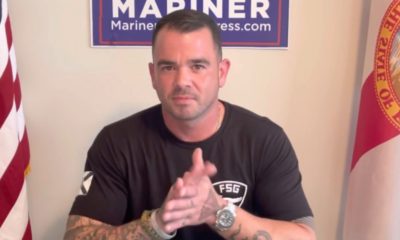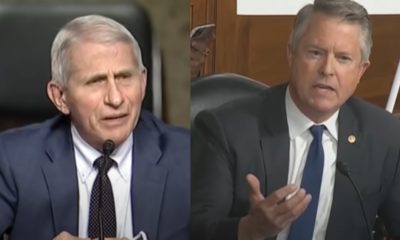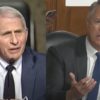NEWS
Rick Perry’s Belief That Trump Was Chosen By God Is Shared By Many In A Rapidly-Growing Christian Movement
Brad Christerson, Biola University and Richard Flory, University of Southern California – Dornsife College of Letters, Arts and Sciences
In a recent interview with Fox News, Secretary of Energy Rick Perry stated that Donald Trump was chosen by God to be president. He said throughout history God had picked “imperfect people” such as King David or Solomon to lead their people.
Perry is not alone. A large number of evangelical Christians in the U.S. believe that God has chosen Donald Trump to advance the kingdom of God on Earth. Several high-profile religious leaders have made similar claims, often comparing Trump to King Cyrus who was asked by God to rescue the nation of Israel from exile in Babylon.
Many of these Christians are part of a movement that we call “Independent Network Charismatic,” or “INC Christianity” in our 2017 book.
Leaders such Rick Perry are connected to this movement. Eight years ago – in August of 2011 – more than 30,000 people cheered wildly when Perry, who was then a U.S. presidential candidate and Texas governor, came center stage at “The Response: A Call to Prayer for a Nation in Crisis” at Reliant Stadium in Houston. Perry quoted from the Bible and preached about the need for salvation that comes from Jesus. Many of the leaders who organized this event are the same leaders who claim that Trump is God’s chosen to advance the Kingdom of God.
We argue that INC Christianity is significantly changing the religious landscape in America – and the nation’s politics.
Here is what we found about INC
INC Christianity is led by a network of popular independent religious entrepreneurs, often referred to by their followers as “apostles.” They have close ties, we found, to some conservative politicians, including Sarah Palin, Newt Gingrich, Bobby Jindal, Rick Perry and more recently President Donald Trump.
Charismatic Christians emphasize supernatural miracles and divine interventions, but INC Christianity is different from other charismatics – and other Christian denominations in general – in the following ways:
- It is not focused primarily on building congregations but rather on spreading beliefs and practices through media, conferences and ministry schools.
- It is not so much about proselytizing to unbelievers as it is about transforming society through placing Christian believers in powerful positions in all sectors of society.
- It is organized as a network of independent leaders rather than as formally organized denominations.
Finding followers
INC Christianity is the fastest-growing Christian group in America and possibly around the world. Over the 40 years from 1970 to 2010, the number of regular attenders of Protestant churches as a whole shrunk by an average of .05% per year, while independent neo-charismatic congregations, the category that includes INC groups, grew by an average of 3.24% per year.
Its impact, however, is much greater than can be measured in church attendance. This is because INC Christianity is not centrally concerned with building congregations, but spreading beliefs and practices.
The influence of INC Christianity can be seen in the millions of hits on many of their web-based media sites, large turnouts at stadium rallies and conferences and millions of dollars in media sales.
In interviews, leaders of Bethel, an INC ministry based in Redding, California, claimed to have had an income of US$8.4 million in media sales in 2013. This included music, books, DVDs and web-based content. Another $7 million came from tuition to the Bethel School of Supernatural Ministry.
Sean Feucht, one of Bethel’s popular musicians and worship leaders, is now running for Congress in California’s Third Congressional District.
Appeal of INC
As part of our research, we conducted in-depth interviews with senior leaders, staff and current and former participants in INC Christian ministries. We also conducted supplementary interviews with Christian leaders and scholars with knowledge of the changing religious landscape and attended conferences, numerous church services, ministry school sessions, healing sessions and exorcisms. In all, we conducted 41 in-depth interviews.
Our primary conclusion is that the growth of these groups is largely the result of the informal way in which the network is governed. When compared to the oversight and accountability of formal congregations and denominations, the network allows for more experimentation. This includes “extreme” experiences of the supernatural, unorthodox beliefs and practices, and financing as well as marketing techniques that leverage the power of the internet.
We also witnessed the appeal of INC Christianity, particularly among young people. We saw the thrill of holding impromptu supernatural healing sessions in the emergency room of a large public hospital, the intrigue of ministry school class sessions devoted to the techniques of casting out demonic spirits and the adventure of teams of young people going out into public places, seeking direct guidance from God as to whom to heal or to relay specific divine messages.
‘Seven mountains of culture’
Most Christian groups in America have seen the role of the church as connecting individuals to God through the saving grace of Jesus and building congregations that provide communities of meaning and belonging through worship services.
They also believe in serving and providing for the needs their local communities. Such traditional Christian groups believe that although the world can be improved, it will not be restored to God’s original plan until Jesus comes back again to rule the Earth.
INC beliefs, however, are different. Most INC Christian groups we studied seek to bring heaven or God’s intended perfect society to Earth by placing “kingdom-minded people” in powerful positions at the top of all sectors of society. These “seven mountains of culture” include business, government, media, arts and entertainment, education, family and religion. In this form of “trickle-down Christianity,” they believe if Christians rise to the top of all seven “mountains,” society will be completely transformed.
“The goal of this new movement is transforming social units like cities, ethnic groups, nations rather than individuals,” one INC leader we interviewed explained. “If Christians permeate each mountain and rise to the top of all seven mountains…society would have biblical morality, people would live in harmony, there would be peace and not war, there would be no poverty.”
We heard these ideas repeatedly in most of our interviews, at events we attended and in INC media materials.
Most significantly, since the 2016 presidential election, some INC leaders have released public statements claiming that the Trump presidency is part of fulfilling God’s plan to “bring heaven to Earth” by placing believers in top posts, including Perry, Secretary of Education Betsy DeVos and Secretary of Housing and Urban Development Ben Carson.
Changing the landscape
INC Christianity is a movement to watch. If it continues to draw adherents in large numbers in the future, as we predict, it will produce a growing number of Christians who see their goal not just as saving souls but as transforming society by taking control over its institutions.
While the Ukraine scandal, family separations at the border, and allegations of corruption have made some evangelical Christians question their support of Donald Trump, most of those steeped in INC Christianity will never abandon their president.
To them, as we found, to oppose Donald Trump is to oppose God who chose him specifically to bring America and the world back to God.
This is an updated version of a piece first published on March 15, 2017.
[ Thanks for reading! We can send you The Conversation’s stories every day in an informative email. Sign up today. ]Brad Christerson, Professor of Sociology, Biola University and Richard Flory, Senior Director of Research and Evaluation, University of Southern California – Dornsife College of Letters, Arts and Sciences
This article is republished from The Conversation under a Creative Commons license. Read the original article.
![]()




















